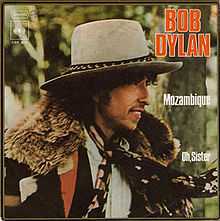Mozambique (song)
| "Mozambique" | ||||||||||||
|---|---|---|---|---|---|---|---|---|---|---|---|---|
 | ||||||||||||
| Single by Bob Dylan | ||||||||||||
| from the album Desire | ||||||||||||
| B-side | "Oh, Sister" | |||||||||||
| Released | February 17, 1976 | |||||||||||
| Format | Single | |||||||||||
| Recorded | July 30, 1975 at Columbia Studios, New York | |||||||||||
| Genre | Folk rock | |||||||||||
| Length | 3:00 | |||||||||||
| Label | Columbia | |||||||||||
| Writer(s) | Bob Dylan, Jacques Levy | |||||||||||
| Producer(s) | Don DeVito | |||||||||||
| Bob Dylan singles chronology | ||||||||||||
| ||||||||||||
| ||||||||||||
"Mozambique" is a song written by Bob Dylan and Jacques Levy that was originally released on Dylan's 1976 album Desire. It was also released as a single and reached #54 on the Billboard Hot 100.
At the time of the song's release, the titular country of Mozambique had just emerged from a ten-year insurgency war against Portugal which led to Mozambique's independence.[1][2] As a result, some left wing supporters wanted to see the song as lending support to the newly independent country.[1] However, the lyrics of the song don't support such an interpretation, being slight and treating the country as merely a place for a romantic getaway in the sun, apart from a fleeting reference to "people living free".[1] This angered some of Dylan's fans.[2] Music critic Paul Williams suggests that "Mozambique" may have had its genesis in Dylan's desire to write a song about Marseilles.[3]
The melody received more praise than the lyrics. Robert Shelton describes the tune as "playful."[4] Authors Oliver Trager and John Nogowski both describe the melody as "great" and particularly praise the violin playing of Scarlet Rivera.[1][5]
Author Oliver Trager describes "Mozambique" as "a light love song with lighter political overtones."[1] Allmusic critic Stephen Thomas Erlewine calls it "effervescent" and "Dylan at his breeziest."[6] Paul Williams considers "Mozambique" to be one of several songs on Desire with "wonderful, inventive, pleasure-giving" music which nonetheless fails to reach the intensity and unity of the other songs because the lyrics are "a little too vague, too clever" and "too distanced."[3] Dylan biographer Clinton Heylin considers the song to be a "ditty dredged up from the bottom of the barrel," "ghastly" and "the weakest song on Desire."[2][7]
"Mozambique" was also released as a single as a follow up to the Top 40 hit "Hurricane" and it reached #54 on the Billboard Hot 100.[8] Heylin suggests that Dylan may have released it as a single over songs fans might have preferred—particularly "Sara"—to spite fans who criticized the song for its slight lyrics trivializing the conflict in Mozambique.[2] The song also appeared on the compilation album Masterpieces.[9] A live performance was included in the television special Hard Rain but not on the associated album.[1][3]
References
- ↑ 1.0 1.1 1.2 1.3 1.4 1.5 Trager, O. (2004). Keys to the Rain. Billboard Books. p. 436. ISBN 0823079740.
- ↑ 2.0 2.1 2.2 2.3 Heylin, C. (2010). Still on the Road. Chicago Review Press. p. 83. ISBN 9781556528446.
- ↑ 3.0 3.1 3.2 Williams, P. (1994). Bob Dylan Performing Artist: 1974-1986. Omnibus Press. pp. 45, 47, 88. ISBN 0711935556.
- ↑ Shelton, R. (1986). No Direction Home. Da Capo Press. p. 466. ISBN 0306807823.
- ↑ Nogowski, J. (2008). Bob Dylan: A Descriptive, Critical Discography and Filmography (2nd ed.). McFarland. p. 75. ISBN 9780786435180.
- ↑ Erlewine, S.T.. "Desire". Allmusic. Retrieved 2012-09-05.
- ↑ Heylin, C. (1995). Bob Dylan: The Recording Sessions 1960-1994. St. Martin's Griffin. p. 113. ISBN 0312150679.
- ↑ "Desire Awards". Allmusic. Retrieved 2012-09-05.
- ↑ "Mozambique". Allmusic. Retrieved 2012-09-05.
| ||||||||||||||||||||||||||||||||||||||||||||||||||||||||||||||||||||||||||||||||||||||||||||||||||||||||||||||||||||||||||||||||||||||||||||||||||||||||||||||||||